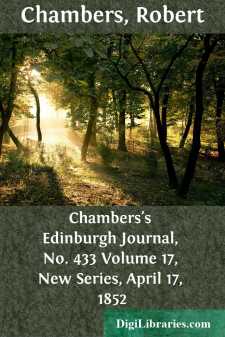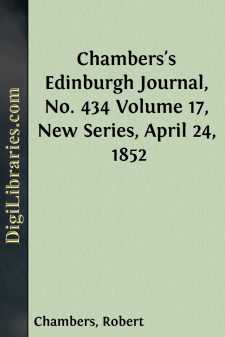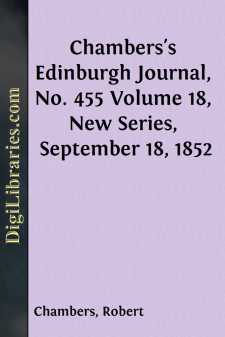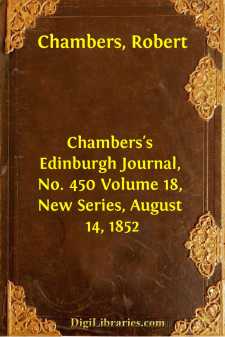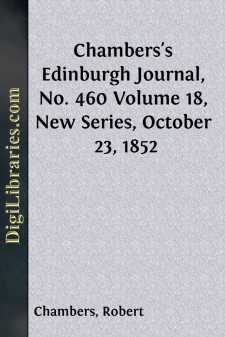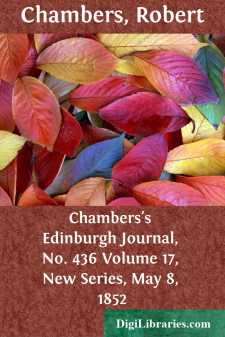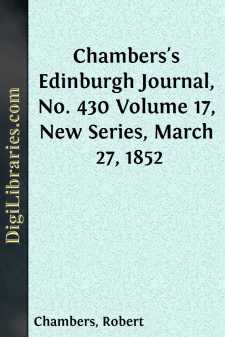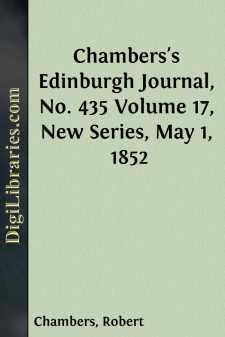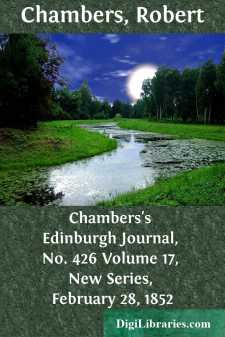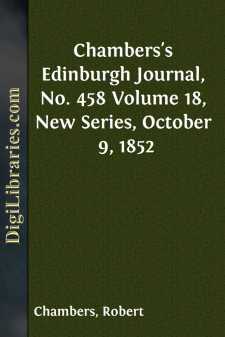Categories
- Antiques & Collectibles 13
- Architecture 36
- Art 48
- Bibles 22
- Biography & Autobiography 813
- Body, Mind & Spirit 142
- Business & Economics 28
- Children's Books 15
- Children's Fiction 12
- Computers 4
- Cooking 94
- Crafts & Hobbies 4
- Drama 346
- Education 46
- Family & Relationships 57
- Fiction 11829
- Games 19
- Gardening 17
- Health & Fitness 34
- History 1377
- House & Home 1
- Humor 147
- Juvenile Fiction 1873
- Juvenile Nonfiction 202
- Language Arts & Disciplines 88
- Law 16
- Literary Collections 686
- Literary Criticism 179
- Mathematics 13
- Medical 41
- Music 40
- Nature 179
- Non-Classifiable 1768
- Performing Arts 7
- Periodicals 1453
- Philosophy 64
- Photography 2
- Poetry 896
- Political Science 203
- Psychology 42
- Reference 154
- Religion 513
- Science 126
- Self-Help 84
- Social Science 81
- Sports & Recreation 34
- Study Aids 3
- Technology & Engineering 59
- Transportation 23
- Travel 463
- True Crime 29
Chambers's Edinburgh Journal, No. 433 Volume 17, New Series, April 17, 1852
by: Robert Chambers
Description:
Excerpt
THE DINGY HOUSE.
London is like a large company, where it is necessary for the master or mistress of the house to introduce a great many people to each other. Everybody in that overgrown metropolis has things within a few doors of his residence, which, if they were suddenly described to him, he would hear of with deep interest or extreme astonishment. There is a plain back street near the Haymarket, bearing the title of Great Windmill Street, in which there is a large, dingy-looking house standing somewhat detached, and not appearing to be in the hands of ordinary tenants. Very near this, is a distinguished haunt of gaiety, very well whitened, and looking very smart, but which would be no index to the character or purposes of the dingy mansion. A group of dirty children will be found disporting at marbles or pitch-and-toss on the paved recess in front; but neither would that scene be found in any kind of harmony with the house itself. It is evidently a house with a mystery.
Very few people would be found in the course of a day to pass out of or into that house. A blind would seldom be raised. A fashionable carriage would not once in a twelvemonth be seen rolling up to the gloomy portals. Supposing, however, that any one were to be so curious as to watch the house for an afternoon, he would probably see two women in extraordinary dresses come up to the door, apparently laden with some heavy packages, shrouded under their wide black cloaks. He would see the door opened with some caution, and the two women would then walk in, and be seen no more for that day. He might speculate for hours about the business in which these women had been engaged, but in vain. He might make inquiries in the neighbourhood, but probably with as little result; for, in London, it must be an extraordinary family indeed which provokes any inquiry among neighbours, and most undoubtedly the inmates of the mansion would never think of proclaiming what they were, or how they lived.
Having perhaps by this time excited some curiosity, we must endeavour to satisfy it. We happened by mere chance, when spending an evening with a friend in a distant part of the town, to hear of this house and its tenants; and the doings and character of its inmates struck our mind as something so extraordinary, and in some respects so beautiful, that we resolved, if possible, to pay it a visit. We did so a few days thereafter, under the conduct of a young friend, who kindly undertook to smooth away all difficulties in the way of our reception. We can, therefore, give some account of the dingy house, with a tolerable assurance that, strange as the matter may appear, it is no more than true.
This dingy house is possessed by ten women, chiefly natives of France, who form a branch of a religious society of recent origin in that country, entitled, Les Petites Sœurs des Pauvres (Little Sisterhood for the Poor). They have been in this house only for a few months, but are already fully engaged in the business to which they have devoted themselves—which is the care and nurture of infirm and destitute old women....


